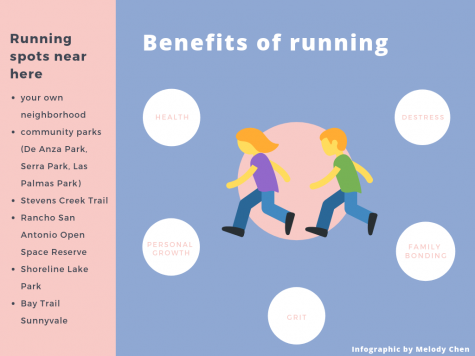The Melodic Line: Running as an antidote to academic stress

The minute I arrive home from school, I rush upstairs, change into my running clothes, snatch my sneakers and head outdoors. The air buzzes with undiminished energy. The sun bobs up and down, mimicking my rhythm. The tension from late night studying and back-to-back extracurriculars seems to wash away as I focus on my advancing treads.
For once, I feel liberated from the stress of grades and extracurriculars.
According to RunSociety, runners tend to be less receptive to stress and are better at controlling their moods. Running can also boost endorphins, which have the effect of natural painkillers. Long-distance runners may even experience a surge of euphoria dubbed “runner’s high.”
Yet, it doesn’t come easy for runners to say that they absolutely enjoy running. You have to push yourself harder than your body can handle. These unpleasant episodes often occur during the middle of a run when your body switches to brain talk.
Teetering between persistence and retaliation, your mind grows more rebellious. In the comical sense, your shoulder angel would push you to keep going, while your shoulder devil would entice you to take a break. Yet, in reality, not only do you compete against your personal record, you also compete against the pink, wrinkly blob in your head.
Runners also have to be resilient and firm with themselves to achieve true grit. Fundamentally, running is a battle to prove to yourself you can strive through the pain. You also have to learn to trust your body that you can exert past your limit.
In fact, perseverance in running is reflected in perseverance at school. Running can condition you to achieve grit in school as you become familiar with the feeling in a different setting. According to a cross-sectional study of university students in Thailand, grit is associated with lower levels of depression and anxiety. Gritty students are open to criticism and believe that failure is essential in the path to success.
The benefits of running do not stop there: it also extends to the post-running stage, as your brain is able to process information faster. With the ability to consume information at a faster rate, students can absorb topics learned in class and finish their homework more efficiently. According to Business Insider, running in the morning can improve productivity.
People argue that running or any form of exercise demands too much time. Running for two to three miles may only cost you 30 minutes. According to The Washington Post, teens spend nearly nine hours a day online. Besides taking up one-eighteenth of your screen time, running can make you more energetic and increase your self-esteem, according to Active.
You don’t have to be a five-star athlete to make running a habit. I joined the track team for a day and quit due to time conflicts. I wanted to develop a routine that fits with my schedule and my capacity. Running on my own and with my family also allows me to find the right balance between distance and speed, which I can gradually improve from there.
To all the non-athletes, it doesn’t hurt to develop a running routine that will bring you positive results in reducing academic stress.







